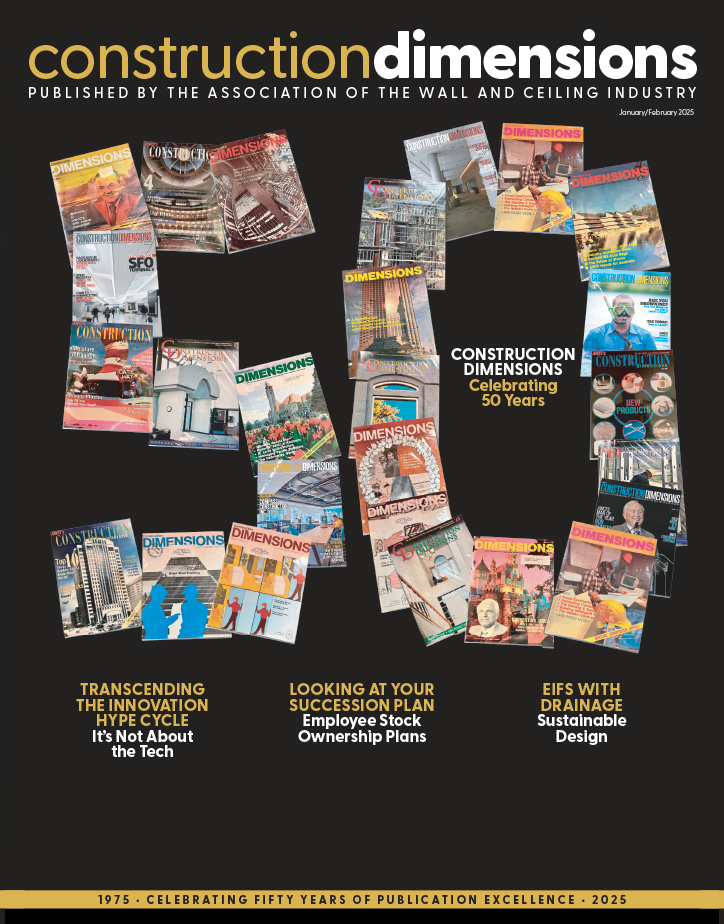United Airlines recently dragged a passenger off one of its overbooked flights. The passenger had been selected randomly to be bumped, but he refused to deplane. Who knew the airline would take such a drastic step?
Service isn’t scoring A’s with many customers these days. It has got me thinking: How do we do in walls and ceilings? Do customers say we give good service?
Fixing Others’ Mistakes
“We do business with people,” says John Hinson, Dallas-Ft. Worth division president at Marek in Coppell, Texas. “We have to make sure that we take care of them.”
Field incidents happen every day. Perhaps an electrician puts an electrical box in the wrong spot. Your craftsman hangs wallboard around it. Later, the electrician realizes the box is off by a few inches and cuts a new hole in the wall. Who’ll patch the first hole? If you do the work, will the electrician pay you? Will you repair the hole for no charge, or file a change request?
Repairing one hole isn’t a problem. But repairing hole after hole on big jobs can be costly. How do you address this service issue? The solution is to delegate decision-making to your team and trust them to do what’s right.
“My foremen and my craftsmen have authority to horse trade,” Hinson says. “They’ll say, ‘You let me use your scaffolding for the rest of the week, because it’s just sitting there, and I’ll fix some holes for you.’”
Trading favors occurs daily in our business. Generally, it’s all good. But, deciding who fixes holes and who cleans up work spaces gets rather ticklish.
Going to the Nth Degree
Fortunately, good GCs hire quality subcontractors. They want projects completed with minimal changes and up-charges. Satisfying the GC is definitely a reason you get re-hired on competitive projects.
Unfortunately, low price carries a lot of weight these days. If United Airlines is willing to drag people off their planes and fight lengthy public relations battles, they do so because low ticket prices fill seats. People may say they won’t fly United, but they’ll fly for the right price.
It’s similar in our industry. Some GCs have little choice but to use less reputable subs, even though such subs can create service headaches. So, how do you combat this low-ball competition? By setting a high bar for quality.
“Clients hire us because they know we’ll go to the nth degree to bring things to their attention,” one wall contractor says.
You point out conflicts like plumbing runs that use 8-inch pipe rather than the 6 inch specified. You inform the GC when millwork may no longer fit because a beam was added that has to be covered with wallboard. You help your customers prepare for problems before it costs them by communicating better than other firms. This calls for soft-skills training, teaching your team how to anticipate issues, resolve them and speak calmly while doing so.
“That’s Why We Hired You”
Recently, my wife and I experienced multiple problems at a Comfort Suites hotel. We asked various staff members to rectify the issues only to find in the end that they had absolutely no leeway to make decisions. Everything had to channel through the hotel manager, who held us hostage to her work schedule. Nothing was resolved.
This is the opposite of service. It’s disappointment, and it leads to the termination of relationships. In contrast, great service pays dividends. Always. Empathetic, knowledgeable and responsive service reinforces the bonds between you and your customers.
Recently, a Marek field superintendent received a congratulatory note for a job well done. A copy of the note made its way to Hinson, who forwarded it to the GC.
“You realize that you have better sequencing, better coordination and greater efficiencies by using us,” Hinson wrote.
“Yeah, I know,” the GC’s president wrote back. “That’s why we hired you.”
Mark L. Johnson writes regularly about customer service. Reach Mark on Twitter, @markjohnsoncomm, and at linkedin.com/in/markjohnsoncommunications.




